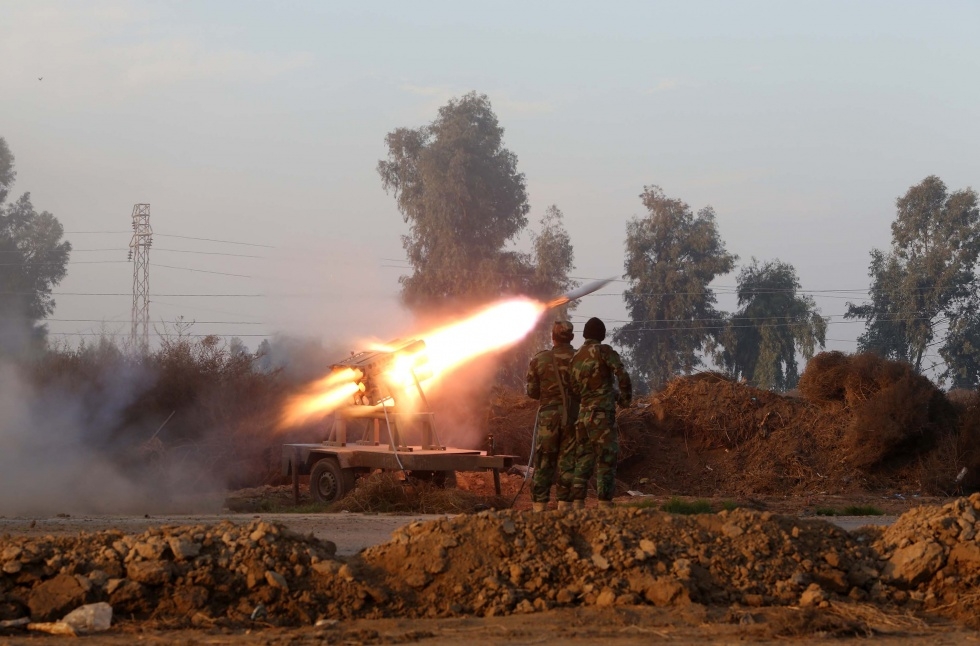Shiite political bloc claims US 'cultivated' Islamic State

A Shiite bloc in the Iraqi parliament on Monday blamed the US for having “cultivated” the Islamic State (IS) while the country’s leader criticised the US-coalition for its ‘slow’ support of Iraq’s army.
The US administration "gave rise to IS, cultivated it and used it as a tool to terrorise the masses,” a spokesperson for the al-Ahrar bloc, a group of politicians following the teachings of Shiite preacher Muqtada al-Sadr, told Anadolu Agency.
"The US supported IS (in the beginning). But it rebelled later on and started to expand,” said Hussein al-Awadi, al-Ahrar's spokesperson.
“That's when the US resorted to remedying its image as if it had no part in the creation of this group," al-Awadi said, adding that the US established an "environment of chaos" in Iraq through "prolonging the war and leaving Iraq dependent on US troops".
Awadi noted that US warplanes have provided IS militants with weapons and ammunitions on multiple occasions, saying each time that it was a mistake.
"Currently, the US has its largest embassy in Iraq, which is an indicator of how big of an invasion it is carrying out in the country. Lebanon and Syria are about to fall in to their (US) trap. However, the wisdom and awareness of the Iraqi, Lebanese and Syrian people will foil this trap and game," he said.
PM: Slow army support
During a visit to Egypt on Sunday, Iraqi Prime Minister Haidar al-Abadi said the US-led coalition has been slow to provide support to Iraq’s army, hampered in large part by wide-spread corruption.
“The international coalition is very slow in its support and training of the army,” Abadi said.
Later, he acknowledged that assistance had accelerated in the past two weeks, but called for a “further acceleration” for the army which he said may need three years to rebuild.
In his statement, Awadi, the al-Ahrar spokesperson, also criticised the failings of the army, who under the previous administration, were driven out of Iraq’s second city of Mosul by a much smaller of force of IS fighters.
"They just surrendered those places without putting up a fight. This was all because of the treason committed by the military leaders appointed by the former government. Commanders were not appointed on the merits of military professionalism and capabilities," he said.
Awadi also praised Abadi, lauding the country's leader for crossing sectarian boundaries, in contrast to the heavy criticism during former Iraqi Prime Minister Nouri al-Maliki’s term in office, often attacked for favouring Iraq’s Shiite majority at the expense of the Sunni minority.
"The former government (under Nouri al-Maliki) was founded on tension,” he said. “There was lots of tension and disagreement between the government and parliament, which also led to the loss of Mosul, Saladin and Anbar."
12 Shiite militiamen killed
Awadi’s comments came as Iraqi authorities said a suicide car bomb killed 12 Shiite militiamen and soldiers north of Baghdad on Monday.
A suicide bomber rammed an explosive-laden car into a gathering of soldiers and Shiite fighters in the town of Abasiyat, 80 miles north of Baghdad, a police spokespeople told Associated Press.
Ten militiamen and two soldiers were killed and 18 people were wounded.
Sectarian violence in Iraq in 2014 hit heights not seen since 2006 as a result of the rise of IS and the opposing Shiite militias, according to Iraqi Body Count, a London-based organisation of academics and activists.
Earlier this year, Iraqi Body Count said that the number of civilians killed last year was 17,049, roughly double the number killed in 2013.
Shiite militias, such as the Sadrist Peace Brigade, have been key opponents of IS in Iraq, though some critics have accused them of engaging in sectarian cleansing.
Last week, al-Sadr, who has publicly condemned sectarian killings, called for the Iraqi government to expose the killers of three Sunni religious clergymen in Basra warning that "terrorism is targeting the relatively secured provinces".
In a statement, he said that the killers want to divide the country and incite Sunnis to sectarian violence.
Though historically opposed to the rule of Saddam Hussein, the Sadrist movement also staunchly opposed the occupation of Iraq by US troops following Hussein’s ouster in 2003.
During the occupation, Muqtada al-Sadr, who comes from a line of influential Shiite clerics, led the Mahdi Army, a paramilitary force he formed in 2003, against US troops and became one of the most iconic figures in the resistance.
Stay informed with MEE's newsletters
Sign up to get the latest alerts, insights and analysis, starting with Turkey Unpacked
Middle East Eye delivers independent and unrivalled coverage and analysis of the Middle East, North Africa and beyond. To learn more about republishing this content and the associated fees, please fill out this form. More about MEE can be found here.




